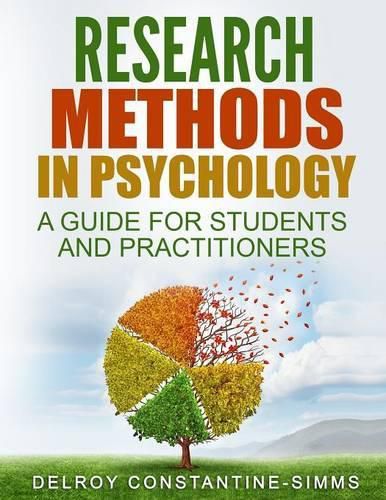Readings Newsletter
Become a Readings Member to make your shopping experience even easier.
Sign in or sign up for free!
You’re not far away from qualifying for FREE standard shipping within Australia
You’ve qualified for FREE standard shipping within Australia
The cart is loading…






This title is printed to order. This book may have been self-published. If so, we cannot guarantee the quality of the content. In the main most books will have gone through the editing process however some may not. We therefore suggest that you be aware of this before ordering this book. If in doubt check either the author or publisher’s details as we are unable to accept any returns unless they are faulty. Please contact us if you have any questions.
This excellent guide to research methods in psychology, eloquently presents research tools and methodological concepts widely shared by psychology students and practitioners. Quite often, books on psychological research methods, tend to be overcomplicated and difficult to use. To combat this issue, this book uses the following approaches to allow a high level of accessibility.
Straightforward Writing– The writing is simple and clear, avoiding idiosyncratic terminology and concepts that rarely come up in practice. Admittedly, there are instances, when technical language must be used. After all, the users of this book are most likely to be under graduates, and researchers with aspirations of acquiring or improving their practical competences in the arena of psychological research.
Limited References–. This book follows the tradition of most academic books by including references. The use of references are limited to methodological classics and sources that serve as specific examples.
Minimal Digressions–Essentially, the inclusion of overly technical writing, and deep philosophical approaches behind each psychological research tool and methodology, has been avoided. This approach enables researchers to simply choose and apply the appropriate psychological tools for their intended research project, with minimal theoretical distractions.
Diverse Examples–A variety of examples from across the entire range of psychology, such as clinical and counseling psychology, which tend to be underrepresented in research methods textbooks.
Traditional Structure–The overall structure of this book, is like most introductory research methods textbook, thus making it relatively easy for experienced instructors in psychological research methods to use.
Show less…
$9.00 standard shipping within Australia
FREE standard shipping within Australia for orders over $100.00
Express & International shipping calculated at checkout
This title is printed to order. This book may have been self-published. If so, we cannot guarantee the quality of the content. In the main most books will have gone through the editing process however some may not. We therefore suggest that you be aware of this before ordering this book. If in doubt check either the author or publisher’s details as we are unable to accept any returns unless they are faulty. Please contact us if you have any questions.
This excellent guide to research methods in psychology, eloquently presents research tools and methodological concepts widely shared by psychology students and practitioners. Quite often, books on psychological research methods, tend to be overcomplicated and difficult to use. To combat this issue, this book uses the following approaches to allow a high level of accessibility.
Straightforward Writing– The writing is simple and clear, avoiding idiosyncratic terminology and concepts that rarely come up in practice. Admittedly, there are instances, when technical language must be used. After all, the users of this book are most likely to be under graduates, and researchers with aspirations of acquiring or improving their practical competences in the arena of psychological research.
Limited References–. This book follows the tradition of most academic books by including references. The use of references are limited to methodological classics and sources that serve as specific examples.
Minimal Digressions–Essentially, the inclusion of overly technical writing, and deep philosophical approaches behind each psychological research tool and methodology, has been avoided. This approach enables researchers to simply choose and apply the appropriate psychological tools for their intended research project, with minimal theoretical distractions.
Diverse Examples–A variety of examples from across the entire range of psychology, such as clinical and counseling psychology, which tend to be underrepresented in research methods textbooks.
Traditional Structure–The overall structure of this book, is like most introductory research methods textbook, thus making it relatively easy for experienced instructors in psychological research methods to use.
Show less…